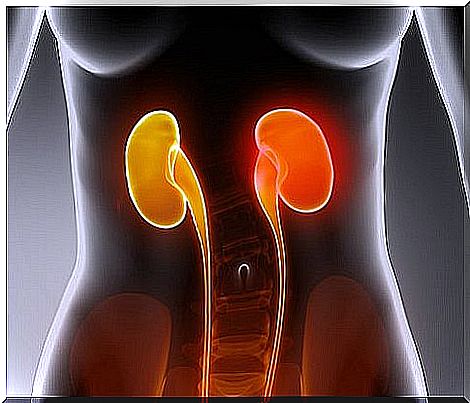Hyperphosphatemia: High Concentrations Of Phosphate In The Blood
Hyperphosphatemia is the situation where phosphorus levels in the blood are higher than those considered normal. Actually, it is not just any phosphor that is taken into consideration for measurement, but specifically inorganic phosphorus.
Although it depends on the laboratory that performs the measurement, phosphorus values between 2.5 and 4.5 mg / dL are considered normal. When the blood test reports measurements greater than 4.5, hyperphosphatemia can be diagnosed.
Phosphorus is an element that performs important functions within the human body. Although unknown to many, it is a macromineral that the body requires to carry out metabolic functions that it cannot perform otherwise.
Of all the phosphorus that we have in the body, more than two thirds are contained in the bones. The remainder is located in tissue cells to generate operating energy.
As we can see, according to their body distribution, it is the bones and teeth that are most affected by situations of phosphorus deficiency or over-accumulation. On the other hand, phosphorus is an ally of calcium, which causes kidney problems when hyperphosphatemia appears.
We obtain phosphorus from food, generally to a high degree when the diet is varied. Under normal conditions, the excess phosphorus that the body does not need is eliminated renally in the urine and intestinally with the fecal matter.
The foods richest in phosphorus are red and white meats and nuts, such as almonds and walnuts. There is also good availability of the element in dairy products, such as milk, yogurt or cheese. Some countries have food laws that oblige industries to add phosphorus to certain products as a form of fortification.
Causes of hyperphosphatemia
Hyperphosphatemia becomes more common over the years because its main cause is kidney failure. This situation in which the kidneys are unable to concentrate urine is much more prevalent among the elderly than young people. But, in addition to kidney failure, there are other causes of hyperphosphatemia:
- Hypoparathyroidism: Parathyroid hormone regulates the metabolism of phosphorus and calcium. In hypoparathyroidism there is little or no production of the hormone and this can result in a decrease in calcium with an increase in phosphorus in the blood.
- Hypervitaminosis D: along with calcium and phosphorus regulations, vitamin D is linked. Either because a dysfunction in the parathyroid glands alters vitamin D or because it is elevated in the blood due to another cause, it is possible that it tends to increase blood phosphorus.
- High phosphorus intake : hyperphosphatemia from excessive intake is rare. If the body is working properly, it will eliminate the excess in urine or feces so that it does not accumulate.
- Prolonged Exercise – Long-term, strenuous exercise that damages muscles releases phosphorus from muscle cells into the blood.
- Chemotherapy: when patients receive chemotherapy drugs due to an oncological pathology, cells that are dying rapidly also release their internal phosphorus into the blood, causing hyperphosphatemia. This is known as tumor lysis syndrome, along with other symptoms also produced by chemotherapy.

Symptoms of hyperphosphatemia
Elevated phosphate in the blood may be found more as an incidental event than because of suspicious symptoms. In most cases, the data appears because a general blood test has been requested to assess other diseases in the person.
People with hyperphosphatemia rarely have symptoms from the high phosphorus in their blood. However, they can consult for kidney problems derived from their hyperphosphatemia, or also for muscular signs.
When phosphorus increases its blood concentration, calcium usually decreases, producing hypocalcemia. In this state, the muscles cramp frequently, even with the appearance of spasms.
Another long-term consequence is the alteration of the arterial walls. Excess phosphorus can deposit on the walls of blood vessels, in combination with calcium, contributing to arteriosclerosis, increasing the risk of serious cardiovascular events.

Treatment of hyperphosphatemia
When hyperphosphatemia is caused by an underlying disease, such as kidney failure or hypoparathyroidism, then the treatment will be the correction of that pathology. On the other hand, to treat excess phosphorus itself there are three alternatives :
- Low phosphate diet: with the advice of a nutritional professional, a diet is made that does not exceed 1000 milligrams of phosphorus per day.
- Dialysis: artificially filtering the blood supplies the kidney function when it is not at its maximum capacity.
- Chelators: there are drugs capable of binding the phosphorus that enters with food to prevent the intestine from absorbing it. In this way, phosphorus is removed to the outside without reaching the blood.
Of course, it will be the doctor who decides which treatment is best in each case. Often times, extreme measures are not necessary, so if you’ve received a test that reports hyperphosphatemia, don’t be alarmed. You should consult a professional to assess what steps to take.








